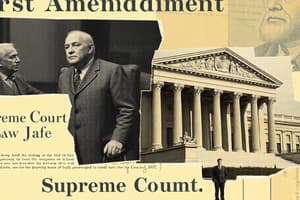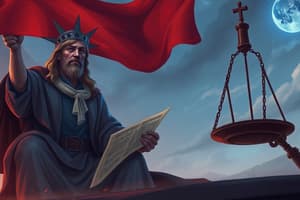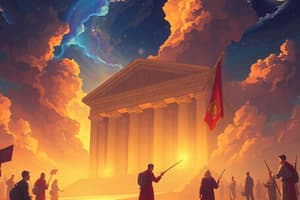Podcast
Questions and Answers
What is the primary function of the Constitution as described?
What is the primary function of the Constitution as described?
- To limit the powers of government (correct)
- To create a democratic government structure
- To promote social welfare programs
- To regulate personal behavior of citizens
What has the expansion of congressional commerce power allowed Congress to do?
What has the expansion of congressional commerce power allowed Congress to do?
- Create laws exclusively about commerce
- Only regulate international trade
- Establish laws on social security and labor standards (correct)
- Prevent disasters in the stock market
How has the interpretation of the First Amendment changed over time?
How has the interpretation of the First Amendment changed over time?
- It now primarily protects speech criticizing the government (correct)
- It has become more restrictive towards public speech
- It was initially focused on political parties only
- It only applies to verbal communication now
What was Justice Scalia's view on the constitutionality of same-sex marriage in relation to the Fourteenth Amendment?
What was Justice Scalia's view on the constitutionality of same-sex marriage in relation to the Fourteenth Amendment?
What is a significant consequence of constitutional change as noted in the content?
What is a significant consequence of constitutional change as noted in the content?
What interpretation strategy is reflected by Justice Scalia's view of constitutional meaning?
What interpretation strategy is reflected by Justice Scalia's view of constitutional meaning?
What significant development regarding women's rights occurred after the ratification of the Constitution?
What significant development regarding women's rights occurred after the ratification of the Constitution?
How did the interpretation of the Equal Protection Clause change over time?
How did the interpretation of the Equal Protection Clause change over time?
What influenced the Court’s decision in Obergefell regarding same-sex marriage?
What influenced the Court’s decision in Obergefell regarding same-sex marriage?
What did the ratifiers of the Fourteenth Amendment believe regarding public school desegregation?
What did the ratifiers of the Fourteenth Amendment believe regarding public school desegregation?
Which historical event influenced changing views regarding racial discrimination in the U.S.?
Which historical event influenced changing views regarding racial discrimination in the U.S.?
What was the outcome of the proposed amendment to prohibit sex discrimination?
What was the outcome of the proposed amendment to prohibit sex discrimination?
What aspect of constitutional interpretation does the case of Brown v. Board of Education illustrate?
What aspect of constitutional interpretation does the case of Brown v. Board of Education illustrate?
Flashcards
Constitution as law of lawmaking
Constitution as law of lawmaking
The Constitution outlines and restricts the government's authority, establishing rules for lawmaking.
Commerce Clause
Commerce Clause
The constitutional power granted to Congress to regulate trade among states.
First Amendment
First Amendment
Guarantees freedoms of speech and religion, among others.
Constitutional Change
Constitutional Change
Signup and view all the flashcards
Judicial Interpretation
Judicial Interpretation
Signup and view all the flashcards
Originalism
Originalism
Signup and view all the flashcards
Equal Protection Clause
Equal Protection Clause
Signup and view all the flashcards
Sex Discrimination
Sex Discrimination
Signup and view all the flashcards
Racial Segregation
Racial Segregation
Signup and view all the flashcards
Constitutional Interpretation
Constitutional Interpretation
Signup and view all the flashcards
Vague constitutional provisions
Vague constitutional provisions
Signup and view all the flashcards
Popular Values
Popular Values
Signup and view all the flashcards
Same-sex marriage
Same-sex marriage
Signup and view all the flashcards
Study Notes
Democratic Constitutionalism
- The Constitution establishes rules for lawmaking, limiting government powers. Examples include specific roles for the Senate.
- Disputes about the Constitution are rare when it's clear and specific.
- Congress has broad power over commerce and other areas.
- Modern laws extend beyond the original intent of the Framers, including social security, fair labor standards, and anti-discrimination.
Constitutional Change
- Constitutional change is common, evolving over time.
- The First Amendment's reach was limited initially, focusing on protecting against criminalizing speech criticizing the government.
- Modern court cases have clarified the intent of the First Amendment and its use to protect from criminal speech.
Obergefell v. Hodges (2015)
- Justice Scalia disagreed with Obergefell, citing the Fourteenth Amendment's original intent regarding marriage.
- Scalia argued that interpretation of broad constitutional clauses should focus on the understanding at the time of ratification. This approach is known as originalism.
- Originalism means interpreting the Constitution based on the understanding of its framers at the time of ratification. The meaning doesn't change.
Equal Protection Clause
- The Equal Protection Clause has evolved in its interpretation; protecting women is now a principle, as with same sex marriage.
- Historically states had unequal and discriminatory systems against women.
- There has been a shift in societal and legal views, leading to changes in constitutional interpretation. (e.g., Brown v. Board of Education).
- Interpreting broad clauses should consider that societal values change over time.
Studying That Suits You
Use AI to generate personalized quizzes and flashcards to suit your learning preferences.




